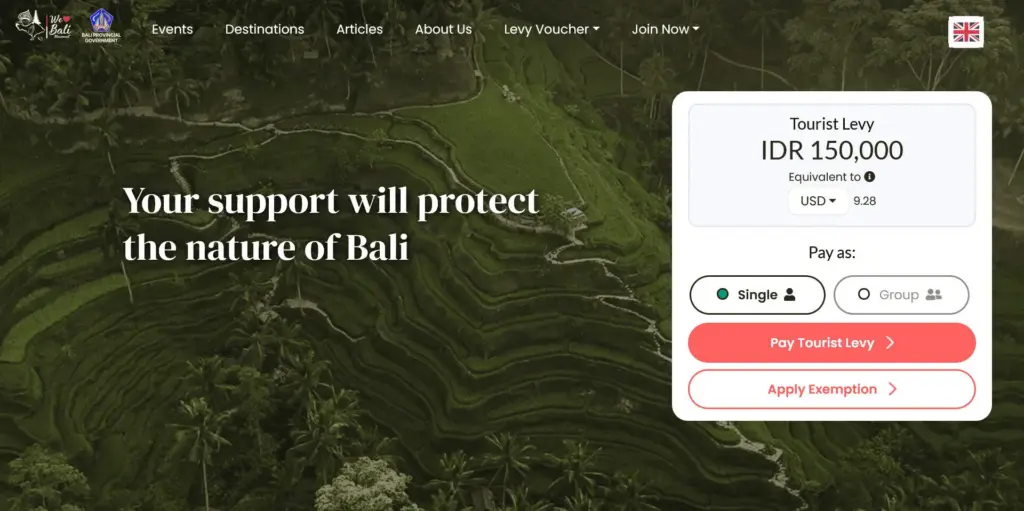Bali is famous for offering incredible value. Luxurious villas, poolside cocktails, private drivers, and multi-course dinners often cost a fraction of what you’d pay in Australia, Europe, or the US. But ask any seasoned traveller to Bali, and you’ll hear a familiar warning: budget more than you think.
It’s not that Bali is full of deliberate “gotchas” – many extra costs are legitimate, linked to government regulations, community projects, or tourism infrastructure. Others are more about local customs and expectations. The problem is that first-time visitors don’t always know they exist, and the little charges can add up over the course of a trip.
Here’s a closer look at the hidden fees, surcharges, and costs that can catch you off guard in Bali, and how to plan for them.
TOURISM TAXES AND DEVELOPMENT FEES

In February 2024, Bali introduced a tourist levy of IDR 150,000 (around USD $10) per person, payable on arrival. The funds are earmarked for cultural preservation and environmental protection. While the amount is modest, travellers arriving in large groups or families can find the total adds up quickly.
On top of the main levy, some popular attractions have their own development fees. Temples, nature reserves, and cultural sites may charge IDR 20,000 to 50,000 per person for entry, sometimes labelled as a “maintenance” or “community development” fee. This is common at places like Uluwatu Temple, Besakih Temple, and Tirta Empul.
In most cases, these fees are legitimate, going toward upkeep or community projects. But they can come as a surprise if you haven’t factored them into your daily budget.
HARBOUR AND PORT TAXES
If you’re taking a boat to the Gili Islands, Nusa Penida, or Nusa Lembongan, expect to pay a small harbour tax at the port. This is often collected at a booth before boarding and may not be included in your ticket price.
The amount is usually in the range of IDR 10,000 to 25,000 per person, but because it’s charged each way, it doubles for return trips. At busy harbours like Sanur or Padang Bai, it’s easy to overlook this cost until you’re already in line.
LOCAL COMMUNITY CONTRIBUTIONS
In rural areas or smaller villages, you may be asked for a donation to enter a waterfall, hike through rice terraces, or visit a viewpoint. These contributions are often collected by local youth or community groups and can range from IDR 5,000 to 20,000 per person.
While some travellers feel these “fees” are just opportunistic, they are often a form of micro-tourism with money going directly to the local community. Still, they can appear multiple times in a single day if you’re visiting several small sites.
TEMPLE SARONG RENTALS
Many temples in Bali require visitors to wear a sarong and sash as a sign of respect. If you don’t bring your own, you can usually rent one at the entrance for IDR 5,000 to 15,000.
The fee isn’t high, but if you’re visiting multiple temples in one day, the rental costs can quickly outweigh the price of buying a sarong outright from a market. A basic sarong costs around IDR 50,000 to 70,000 and can be reused throughout your trip.
RESTAURANT AND BAR SERVICE CHARGES

When dining out, it’s common to see an extra 15 to 21% added to your bill, split between a government tax (10%) and a service charge (usually 5 to 11%). Some high-end restaurants even go slightly higher on the service charge.
The catch? Not all menus show prices as “++” (meaning plus tax and service), so you may think you’re paying the menu price only to have it bumped up at the end. This is perfectly legal, but it can make a big difference if you’re budgeting tightly.
AIRPORT DEPARTURE TAX (MOSTLY GONE, BUT CHECK)
Bali used to have a separate airport departure tax that travellers had to pay in cash before boarding flights. This is now included in most airline tickets, but in rare cases, especially with smaller domestic carriers, fees can still be charged at the airport. It’s worth confirming with your airline before you travel.
PARKING AND DROP-OFF FEES
If you’re hiring a driver for the day or using ride-hailing apps like Grab or Gojek, remember that some locations charge parking or drop-off fees. Airports, malls, and tourist sites often have gated entry points where a ticket is issued.
The fees are small (usually IDR 2,000 to 10,000), but they’re charged per vehicle and per entry, so multiple stops in one day can add up. Drivers may ask you to cover these costs, especially on private tours.
BAGGAGE FEES ON DOMESTIC FLIGHTS
If you’re adding a side trip to Lombok or Java, be aware that many Indonesian domestic airlines have strict baggage limits. While international tickets often include 20 or 30kg of checked baggage, domestic routes may include only 15kg, or none at all, depending on your ticket type.
Extra baggage fees can be steep, especially if you wait until check-in to pay. Pre-booking online is usually cheaper.
BEACH CLUB MINIMUM SPENDS
Bali’s beach clubs are famous for their oceanfront pools, music, and cocktails – but the price of entry is often tied to a minimum spend. This means you commit to spending a set amount on food and drinks to use the loungers, daybeds, or pool facilities.
Minimum spends can range from IDR 500,000 to 1,000,000 per person at the most popular venues. It’s not a problem if you’re planning a long, indulgent afternoon – but it can be an unpleasant surprise if you only wanted a quick dip and a juice.
EXTRA CHARGES ON TOURS AND ACTIVITIES
Some tours and activities in Bali quote a base price but have optional extras that are almost essential. A trekking tour might require you to pay a separate fee for the entrance to a national park. A diving trip might exclude equipment rental in the base price. Even white-water rafting sometimes has a mandatory insurance fee payable on arrival.
These extras aren’t always hidden intentionally, but they can make an activity 20 to 30% more expensive than the advertised price.
TIPS FOR AVOIDING SURPRISE COSTS
· Ask What’s Included: Before booking tours, transfers, or tickets, confirm whether taxes, fees, and equipment rentals are included.
· Carry Small Notes: Many extra charges are small, and having the right change speeds things up.
· Read Menus Carefully: Look for “++” on restaurant menus, and if it’s not clear, ask before ordering.
· Buy Your Own Sarong: Saves repeated rental fees at temples.
· Budget a Daily Cushion: Adding an extra 10 to 15% to your daily budget can cover most small surprises.
THE BIGGER PICTURE
While hidden charges can be annoying, most of them in Bali are relatively small by global travel standards. In many cases, the money goes toward maintaining attractions, funding community projects, or supporting tourism infrastructure. The key is knowing they exist so you can plan for them.
A traveller expecting everything to be “all-inclusive” may feel frustrated. But a traveller who builds in a little extra for the unexpected will find Bali still delivers incredible value – even with a few surprise line items on the bill. Wander Beyond Ordinary!




